|
|
|
Sort Order |
|
|
|
Items / Page
|
|
|
|
|
|
|
| Srl | Item |
| 1 |
ID:
121256
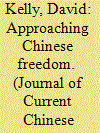

|
|
|
|
|
| Publication |
2013.
|
| Summary/Abstract |
The rise of stability preservation to dominance in the political
order coincided with a highly charged debate over "universal values" and
a closely related discussion of a "China Model". This paper analyses the
critique of universal values as a "wedge issue" that is used to pre-empt
criticism of the party-state by appealing to nationalism and cultural essentialism. Taking freedom as a case in point of a universal value, it
shows that, while more developed in the West, freedom has an authentic
Chinese history with key watersheds in the late Qing reception of popular sovereignty and the ending of the Maoist era. The work of Wang
Ruoshui, Qin Hui and Xu Jilin display some of the resources liberals
now bring to "de-wedging" universal values, not least freedom. They
share a refusal to regard "Western" values as essentially hostile to Chinese.
|
|
|
|
|
|
|
|
|
|
|
|
|
|
|
|
| 2 |
ID:
079675
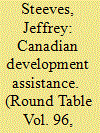

|
|
|
|
|
| Publication |
2007.
|
| Summary/Abstract |
A high degree of consonance exists between officials designing Canadian foreign aid and the political elites of African countries. Both share a commitment to Official Development Assistance and both articulate the identical basket of values underlying current aid policies. These shared values, however, lack resonance once one moves closer to the ground within the current African condition. Drawing on field research in the East African country of Kenya, the distance between the value rhetoric of officials/leadership and the actual situation is addressed. The distance is so great as to undermine the credibility of both aid policies and of those who propagate them.
|
|
|
|
|
|
|
|
|
|
|
|
|
|
|
|
| 3 |
ID:
121818
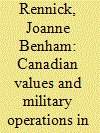

|
|
|
|
|
| Publication |
2013.
|
| Summary/Abstract |
Whereas traditionally religion has played a central role in shaping the shared values in a society, secularization, privatization of religion, and pluralism are changing the values that personnel bring to the Canadian Forces. This late modern reality means that many people who have rejected traditional forms of religion in order to interpret their personal spiritual beliefs for themselves are uncertain about their core values. Differences in values among military personnel are further complicated by the realities of modern military engagements that require a greater need for ethical thinking and moral decision making. This article examines the nature of religion and values in late modern Canadian society and identifies religious leadership as a source of moral and ethical direction as well as consolation in the face of moral anomie. Finally, it highlights the need for greater education about the role of religion and values for military personnel.
|
|
|
|
|
|
|
|
|
|
|
|
|
|
|
|
| 4 |
ID:
136235
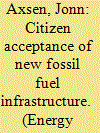

|
|
|
|
|
| Summary/Abstract |
Development of unconventional fossil fuels is generating controversy in North America, where citizen support or opposition can shape political decisions. This study explores the role of values in citizen perceptions. The case study is Canada׳s proposed Northern Gateway Pipeline (NGP), which would transport bitumen from Alberta׳s oil sands to British Columbia׳s (BC) northern coast for export. Data were collected in 2013 from a sample of Canadian citizens (n=2628). The survey instrument elicited citizen perceptions of the NGP, as well as values and attitudes. Respondents in the Alberta subsample are the most likely to support the NGP and to perceive economic benefits. Respondents in the BC subsample are the most likely to oppose the NGP and to perceive environmental risks. To explore heterogeneity in motivations among both subsamples, respondent clusters are constructed based on values. In both regions, opposition is highest in clusters with strong biospheric–altruistic values, while acceptance is highest in clusters with strong traditional values. Regional effects are also substantial; NGP acceptance is higher in each of Alberta׳s clusters relative to equivalent clusters in BC. Regional context seems to shape how values correspond with perceptions. Insights are drawn for energy project development, public consultation and energy planning.
|
|
|
|
|
|
|
|
|
|
|
|
|
|
|
|
| 5 |
ID:
119172
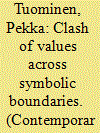

|
|
|
| 6 |
ID:
090882
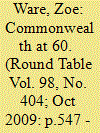

|
|
|
|
|
| Publication |
2009.
|
| Summary/Abstract |
This article offers some thoughts about the Commonwealth in its 60th anniversary year by a young observer from the 'new generation'. It argues that the Commonwealth must pay particular attention to creating a positive first impression on young people, so that it can be defined through the relevance of its current actions rather than through history books. It suggests that, in a crowded international marketplace, the Commonwealth must identify a Unique Selling Point that will be of long-term value to its members, and prove that it can do things and reach places that other international associations cannot. Its shared commitments and values give the Commonwealth the potential to be a true voice of moral authority on the world stage. Yet until the Commonwealth can truly be defined by its Harare principles, rather than with reference to the historical bonds that originally threw it together, it will struggle to transcend the inaccurate image which young people hold of it. The article concludes by looking forward to the global challenges, questions of membership and expansion, and the sensitive issue of Headship that the Commonwealth will be faced with before its 100th birthday.
|
|
|
|
|
|
|
|
|
|
|
|
|
|
|
|
| 7 |
ID:
073208


|
|
|
| 8 |
ID:
107141


|
|
|
|
|
| Summary/Abstract |
Difference in values not a decisive factor in conflicts between states
Recently, Dr. Stefan Halper of the university of Cambridge published an article questioning former US assistant secretary of defence Joseph Nye's view that ' China's rise doesn't mean war." Halper holds that the diplomatic, political, and economic values China advances are antithetical to those that formed that status quo global architecture. The author responds that difference in values is not a major4 contributing factor of conflict between major powers and China's fast development is an opportunity, not a challenge, for the west.
|
|
|
|
|
|
|
|
|
|
|
|
|
|
|
|
| 9 |
ID:
168255
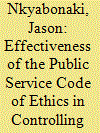

|
|
|
|
|
| Summary/Abstract |
Ethical values are core elements towards efficiency and effectiveness of the public service. Tanzania adopted the public service code of ethics as a behaviour guiding tool to public servants against maladministration practices. The study intended to measure the effectiveness of the public service ethics code as a tool to promote good governance for effective delivery of public service. The study qualitatively analysed the status of how an ethics code may control corruption in the public service. The findings from Toangoma Ward in a study conducted from June to September, 2017 revealed that the principles of a public ethos are not adhered to due to the ecology of public sector that includes, under pay, weak monitoring and evaluation of performance and the culture of nepotism in the public sector. Therefore, these weaknesses have made the public service ethos to be a myth and a failure in the management and provision of social services in Tanzania. The persistence of corruption in the service sectors has continued to ruin and damage the quality of services. The study recommends that the public sector is to be overhauled in terms of promoting best practices such as good pay, meritocracy in recruitment and promotions to higher managerial positions.
|
|
|
|
|
|
|
|
|
|
|
|
|
|
|
|
| 10 |
ID:
192478
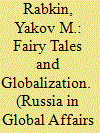

|
|
|
|
|
| Summary/Abstract |
Globalization, albeit no longer so global these days, affects children’s
values, self-images and world outlook through targeted marketing of
fairy tales, games and assorted media products. This article analyzes
these effects and proposes to those concerned a number of measures to
counteract them.
|
|
|
|
|
|
|
|
|
|
|
|
|
|
|
|
| 11 |
ID:
123277


|
|
|
|
|
| Publication |
2013.
|
| Summary/Abstract |
Green initiatives are fast becoming a catchphrase among societies and business entities as these entities strive to ensure more sustainable business operations and lifestyle. Research in green behaviors of consumers especially in Asia and Africa is only just emerging. The objective of this study, therefore, is to examine the factors that influence consumers' green buying behavior. The conceptual framework and hypotheses development are grounded on related literature. We examined six independent variables (environmental attitude, pro-environmental behavior, values, eco-literacy, low price sensitivity and social influence) and the effects on consumer (green) buying behavior. The questionnaire was adapted from validated items from related prior works. The analysis was based on 227 valid responses from residents of a southern state in Malaysia. The findings reveal that four of the six hypotheses were supported. Managerial and research implications of the findings are discussed.
|
|
|
|
|
|
|
|
|
|
|
|
|
|
|
|
| 12 |
ID:
039874


|
|
|
|
|
| Publication |
Cambridge, Cambridge University Press, 1986.
|
| Description |
xi, 250p.
|
| Standard Number |
0521325277
|
|
|
|
|
|
|
|
|
|
|
|
Copies: C:1/I:0,R:0,Q:0
Circulation
| Accession# | Call# | Current Location | Status | Policy | Location |
| 028387 | 153.83/LEV 028387 | Main | On Shelf | General | |
|
|
|
|
| 13 |
ID:
182906


|
|
|
|
|
| Summary/Abstract |
US PRESIDENT Abraham Lincoln [purportedly] said: "America will never be destroyed from the outside. If we falter and lose our freedoms, it will be because we destroyed ourselves."1 It seems that the Americans have been faltering in recent years, wittingly or unwittingly making fateful mistakes that are having an ever-growing impact on the geopolitical situation of the US and the rest of the world. This is confirmed, in my view, by an analysis of certain key factors as well as the nature and possible repercussions of those mistakes stemming from shifts in the infrastructure of the modern world that pose closely interconnected internal and external existential challenges to the West in general and the US in particular...
|
|
|
|
|
|
|
|
|
|
|
|
|
|
|
|
| 14 |
ID:
120147
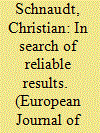

|
|
|
|
|
| Publication |
2013.
|
| Summary/Abstract |
In a recently published article in this journal, Ross Campbell argues that adherence to socialist values establishes a hitherto neglected factor when it comes to the explanation of differences in East and West German citizens' political trust. As the results of his study indicate, adherence to socialist values impacts negatively on citizens' political trust, this effect is more pronounced and more stable over time for East German as compared to West German citizens and is sufficiently strong to eliminate aggregate-level differences in political trust between East and West Germany. However, this research note suggests that Campbell's article contains several substantial inconsistencies and obscurities that question the reliability and validity of the empirical findings presented. It provides a re-analysis of Campbell's main arguments and shows to what extent his initial conclusions can be upheld after the shortcomings have been remedied. The results of this re-analysis suggest that socialist values indeed exhibit a negative impact on German citizens' political trust, which is relatively stronger for East as compared to West German citizens. However, contrary to Campbell's initial results, the negative effect of socialist values on political trust is robust over time for both East and West German citizens. What is more, there is no empirical evidence confirming that differences in adherence to socialist values between East and West German citizens are sufficiently strong to account for aggregate-level differences in political trust. In light of these findings, two of Campbell's three main conclusions are dubious and call for further examination.
|
|
|
|
|
|
|
|
|
|
|
|
|
|
|
|
| 15 |
ID:
113738
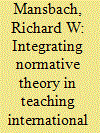

|
|
|
|
|
| Publication |
2012.
|
| Summary/Abstract |
This essay outlines the ways in which the author presents normative theory to his students in his courses and textbook in international relations.
|
|
|
|
|
|
|
|
|
|
|
|
|
|
|
|
| 16 |
ID:
158054
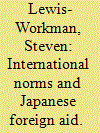

|
|
|
|
|
| Summary/Abstract |
Do norms influence Japan's foreign aid? Japan's aid policy statements have increasingly emphasized humanitarian and democratic values, but few studies demonstrate a shift in Japan's aid policy that reflects this changing discourse. In this study, I seek to determine if Japan's foreign aid commitments increasingly reflect normative factors or continue to be allocated based on commercial or security considerations. The results indicate that humanitarian and democratic values had very little influence on Japan's foreign aid commitments over the entire analysis period. Contrary to conventional wisdom, commercial benefits had little importance before 1992 and are a significant factor only during the 1992–2001 period. Security considerations are strong predictors during the Cold War period and are even more significant after 2001 when Japan's foreign aid became increasingly aligned with US security policies. Further, Japan has not substantially increased the share of its aid to “soft” sectors or disaster response, but it has adopted the international norm of debt relief for highly indebted poor countries and shifted a substantial amount of foreign aid from infrastructure lending to debt forgiveness.
|
|
|
|
|
|
|
|
|
|
|
|
|
|
|
|
| 17 |
ID:
152535
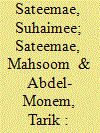

|
|
|
|
|
| Summary/Abstract |
Recent research on Muslim populations has offered interesting but limited insights about values preferences. This mixed-methods study examines the prevalence of support for patriarchy among a sample of religious Muslim university students in Southern Thailand using items from the World Values Survey. It also investigates the durability of these preferences by examining correlations between support or opposition to patriarchal values with preferences towards courtship practices, and elements that influence respondents’ views on gender roles, particularly related to the contemporary socio-economic and political situation facing the Muslim minority of Southern Thailand.
|
|
|
|
|
|
|
|
|
|
|
|
|
|
|
|
| 18 |
ID:
097227
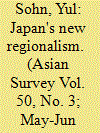

|
|
|
| 19 |
ID:
179253
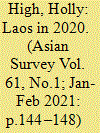

|
|
|
|
|
| Summary/Abstract |
In 2020, Laos successfully contained the spread of COVID-19, with very few cases and no deaths. The key elements of the COVID-19 response reflect not only public health advice but also the core values of the political culture promoted by the ruling Lao People’s Revolutionary Party. These include unity, solidarity, struggle, respect for science, guidance by a strong center, and the extension of the state into everyday life in the form of designated roles, committees, and organizations. These significantly shaped the social fabric drawn on in the COVID-19 response. This success, then, can be read as a reaping of some of the benefits of this political culture. More ominously, the global pandemic exacerbated Lao PDR’s public debt crisis. Born of years of government backing of megaprojects such as hydropower, this debt is the dark harvest of the LPRP’s reign.
|
|
|
|
|
|
|
|
|
|
|
|
|
|
|
|
| 20 |
ID:
110799
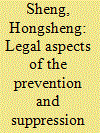

|
|
|
|
|
| Publication |
2012.
|
| Summary/Abstract |
After the occurrence of the 9/11 terrorist attacks against the United States, the
threat of terrorism as a newly emerged non-traditional threat to international peace and
security, and domestic social order, could no longer be under-estimated throughout
the world, and in the Asia-Pacific region in particular. However, in the global
campaign to counter terrorism in general terms and specifically in preventing and
suppressing maritime terrorism, many legal challenges will arise, beyond expectations.
The UN-oriented conventions, regional arrangements and bilateral treaties could be
referred to as the legal basis in doctrine. However, lack of political will and consensus
of the parties concerned and absence of a uniformed definition of terrorism would
still construe further obstacles to undermine efforts through international cooperation
in this regard.
|
|
|
|
|
|
|
|
|
|
|
|
|
|
|
|
|
|
|
|
|